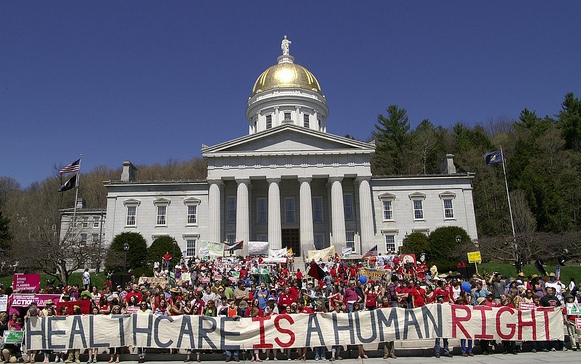Equitable Financing Plan for Vermont’s Universal Healthcare System

In 2011, the Healthcare Is a Human Right (HCHR) Campaign led by the Vermont Workers’ Center with support from Partners for Dignity & Rights won the first-ever legislation in the United States committing a state to creating a universal, publicly financed health care system. The landmark legislation, Act 48, committed Vermont to guarantee health care as a human right to everyone in Vermont, and to finance the whole system equitably, but nearly a decade later, the governor and state legislature has yet to follow through on passing a tax financing bill to make the health care system a reality.
Vermont, like the rest of the country, now faces at least four convergent health care crises. COVID-19 is sweeping the country. Job cuts and the recession are stripping residents of income and insurance coverage. Hospital, drug and insurance companies continue to drive health care prices every higher, and are threatening to close hospitals and clinics that are insufficiently profitable. And poor and working-class people—especially Black people, Native people, immigrants, people who are incarcerated or unhoused, people with disabilities, addiction or mental illnesses and others experiencing multiple forms of oppression—continue to suffer under a privatized, exclusionary health care system that denies medical care, good health and financial security to whole segments of the population. Some 182,000 Vermont residents (one in three adults under 65) are underinsured, cost barriers force over 50,000 people to delay or skip medical care every year, and residents and employers alike are straining under ever-higher premiums and deductibles.
In this context, the Vermont Workers’ Center and Partners for Dignity & Rights are releasing an updated version of our financing plan for Green Mountain Care, Vermont’s promised but unfulfilled universal health care system. A false narrative has taken hold in Vermont and in national health policy circles that Vermont “couldn’t afford” universal health care, but this argument was popularized by former Governor Peter Shumlin based on political motivations, not on health or economic reasoning. As this plan demonstrates, it is entirely possible to finance Green Mountain Care and reduce net health care costs for the vast majority of families by capturing what people in Vermont are paying to private insurance, hospital and drug companies and by raising taxes on big businesses and the wealthiest residents, who control a disproportionate share of the state’s wealth.
Financing Green Mountain Care is both feasible and necessary. We strongly urge Governor Scott and the Vermont State Legislature to fulfill their obligations under Act 48 and finance Green Mountain Care, beginning by passing legislation to require the Agency of Human Services and Green Mountain Care Board to produce new and up-to-date financing and benefit plans.
Additional Resources
 HCHR Financing Plan - July 2020
HCHR Financing Plan - July 2020
 HCHR Financing Plan Executive Summary - July 2020
HCHR Financing Plan Executive Summary - July 2020
